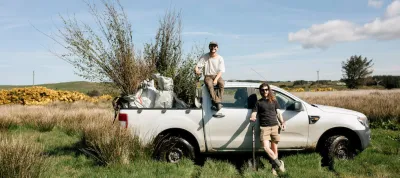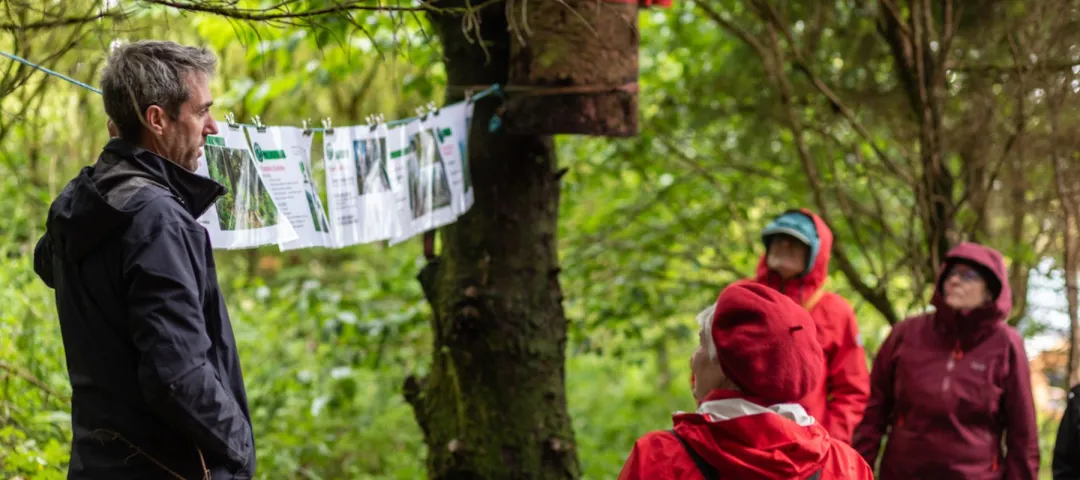General information
RDP Priority
- P4. Ecosystems management
RDP Focus Area
- 4A: Biodiversity restoration, preservation & enhancement
RDP Measure
- M16: Cooperation
Beneficiary type
- Operational group
Summary
The Operational Group Illaun Farm-Forest Alliance EIP has developed an innovative approach to farm forests in Ireland, fostering habitat restoration, improved biodiversity, social engagement and knowledge dissemination.
Woodlands, shelter belts and riparian tree buffers were planted on the 12 participating farms. Farmers were also actively supported in applying for the 'Native Woodland Scheme', resulting more broadly in an increase in the number of native trees in the area.
The 6.5 hectares (ha) Illaun site was integrated into the wider landscape by establishing wildlife corridors, such as linear woodlands, enhanced hedgerows, or wildflower lays. The corridors connect the Illaun site with a species-rich oak woodland site just over one kilometre away.
This Operational Group won the EIP-AGRI Innovation Award 2024 for the category ‘Sustainable forest management’.
Results
The short-term conservation objective of the Illaun Farm-Forest was achieved, and a significant measurable improvement to woodland ecology and biodiversity was made in a 12-month period.

Funding
RDP support: 164 215 (EUR)
Keywords
Context
Hometree is a nature restoration charity based in the west of Ireland, dedicated to establishing and conserving permanent native woodlands to promote land regeneration and biodiversity. Their efforts focus on restoring native temperate rainforests through afforestation, conservation, restoration and educational initiatives.
Hometree operates Ireland's only organically certified native tree nursery, supplying indigenous saplings for their projects. They engage with local communities through volunteer tree-planting days, educational programmes and experience weeks, fostering a deeper connection between people and nature. Since its inception, Hometree has planted over 100 000 trees and continues to spearhead efforts to address Ireland's climate challenges and its declining biodiversity.
Pioneering a catchment-sensitive farming approach, the project collaborated closely with 12 farmers to enhance forestry management, water quality, biodiversity and habitat linkages across the landscape. The biodiversity on the site was assessed beforehand and recommendations were made to improve the ecological status of the habitats.
Objectives
The objective of the project is to increase on-farm biodiversity in the region of the Glendine Valley in West Clare, by creating, expanding and rehabilitating woodland habitats.
Activities
The Illaun Farm Forest EIP planted 30 000 native trees on 12 local farms in the Glendine Valley through small-scale plantings. Each farm received a visit from an ecologist, a forester and a community liaison person. Following a farm walk and discussion with the landowner, a planting plan was mapped out. These plantings took the form of shelter belts – a popular choice for participants on exposed sites – or small woodlands.
Farmers were actively supported to apply for the Native Woodland Scheme, resulting in 11 licence applications being made to the forest service totalling over 100 acres (135 000 trees) of native woodland.
Work was also started to convert a spruce plantation into mixed woodland. Biodiversity in the Illaun woodland hub was assessed before and after interventions to establish the changes in the ecological status of these habitats. These actions were documented through digital storytelling across social media sites, national radio stations and in high-quality promotional videos for wider release.
There was also a significant educational component that involved discussion groups with farmers and demonstration days with experts. Information exchange was promoted within the farming community, which contributed to more positive attitudes towards biodiversity and led to innovative approaches to land management in West Clare.
Main results
As a preparatory activity in August 2021, the Woodland Ecological Condition survey was used to assess the health of a 20-year-old spruce plantation called the Illaun Farm-Forest, providing baseline data as well as a guide for improving ecosystem health across the site. This report listed seven key recommendations to be completed within 12 months.
A follow-up survey in July 2022 identified four key actions: retain a sub-population of existing native and non-native trees; plant a diversity of native broadleaf trees; plant native shrubs (and herbaceous species); and increase deadwood volume. Once carried out, these actions resulted in a four-point increase in the biodiversity metric. Overall, the score increased from poor (22/39) to moderate (26/39).
This result demonstrates that the short-term conservation objectives of the Illaun Farm-Forest were achieved and have made a significant, measurable improvement to woodland ecology and biodiversity over 12 months. The ecological condition of the forest also improved across three biodiversity indicators, namely, the age distribution of trees, the number of native tree species and woodland regeneration. These improvements can all be attributed to planting a diversity of native saplings in the woodland edges and open spaces.
Key lessons
- Significant tangible long-term land use changes occurred as a result of the EIP project, and critically, they happened with the expressed goodwill of the farming community. This was the result of meaningful farmer engagement and was undoubtedly the most significant innovation of the EIP project. Currently, there is a sense that farmers will not engage with licensed forestry companies in Ireland. This EIP project showed that, with the right approach (adequate information and support are on hand), farmers who were previously uninterested in native woodland creation could be successfully engaged.
“We believed farmers were interested in woodland creation but needed objective information from trusted sources and ongoing support in the decision-making process. That proved to be correct and we hope that these finding can be adopted at a national level.”
